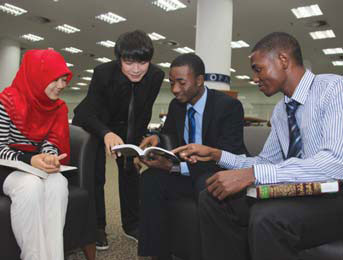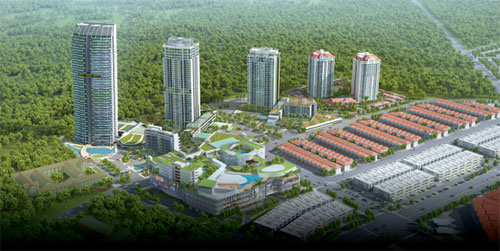A vital hub in the Asia Pacific Region
Updated: 2014-11-28 10:49
(China Daily Europe)
|
|||||||||||
Malaysia intends to promote the huge potential for trade and investment between Asia and Europe during its chairmanship of ASEAN in 2015.
Acting as a bridge between the two regions, Kuala Lumpur has committed itself to restarting negotiations on the ASEAN-EU Free Trade Agreement. In mid-October, Malaysia's Prime Minister, Dato' Sri Mohd Najib bin Tun Abdul Razak, and International Trade and Industry Minister Y.B. Dato' Sri Mustapa Mohamed visited Europe with a large Malaysian trade delegation to take part in the Asia-Europe Meeting (ASEM) Summit in Milan, with Mr. Mustapa going on to visit Frankfurt and Madrid to sound out investment.
Malaysia is keen to inform European investors of the opportunities that further integration in ASEAN offer: in 2015, the ASEAN Economic Community (AEC) will be set up, a market comprising 600 million people with a combined GDP of $2.5 trillion.
The EU is already the largest investor in ASEAN: EU companies have invested an average $17.4 billion annually in the region over the last decade. From next year, doing business in the region will be further improved, including the processes and procedures for foreign companies to conduct businesses in the 10-nation bloc.
At the same time, Malaysia is working to strengthen ties with China. This year marks the 40th anniversary of the establishment of diplomatic relations between Kuala Lumpur and Beijing, an occasion highlighted by Mr. Najib's six-day official visit to China in June 2014.
In October 2013, Chinese President Xi Jinping visited Malaysia to announce that bilateral ties were being upgraded to a comprehensive strategic partnership.
Bilateral trade between both countries has expanded at around 18.2 percent since 2000, and now stands at $106 billion, making China Malaysia's single largest trading partner for the past five consecutive years. What's more, commodities are no longer the major source of goods traded. Manufactured products now comprise as much as 50 percent of Malaysia's annual trade with China, along with other higher value-added goods.
Malaysian businesses also invested more than $6 billion in China last year, while Chinese investors pumped $1 billion into the Malaysian economy during the same period. Among the objectives set between both countries' leaders in June was to increase Malaysia-China bilateral trade to $160 billion by 2017. Malaysia and China have also forged a successful partnership in the burgeoning ASEAN-China Free Trade Area (FTA), set up in 2010.
Meanwhile, in Europe, where growth is still stubbornly slow, growing numbers of companies are engaged in technology transfer to Asia. Currently, more than 1,000 European companies have invested in the manufacturing sector in Malaysia. Infineon Tech, Q-Cells, Siemens, Osram, B.Braun, and BASF are among the household names within the investing community. Germany, the powerhouse of the European Union (EU), continues to be among the top investors in Malaysia. It is also Malaysia's largest EU trading partner.
Apart from roundtable meetings and one-to-one discussions with several top business leaders and captains of industry of Germany, Italy and Spain, Mr. Mustapa spoke with the German and Spanish business communities on business opportunities in Malaysia.
The three countries are important trading partners and sources of foreign investment for Malaysia. Last year, the three markets accounted for 38.2 percent of trade with European Union.
The International Monetary Fund (IMF) has cut projections for growth in Europe for next year, but prospects in Spain and the United Kingdom are promising. Spanish investments in Malaysia are low and Mr. Mustapa is keen to increase the numbers.
ASEAN's appeal, particularly in light of next year's AEC integration, has kept European investment radar focused on the region.
During his brief stopover in Milan, Mr. Mustapa also visited Malaysia's pavilion, which is under construction ahead of the World Expo from May 1 till October 31 next year in the Italian city.
MALAYSIA: A REGIONAL HIGHER EDUCATION HUB
Against the backdrop of increasing cooperation and mobility among ASEAN countries, Malaysia's efforts to position itself as a key regional education hub have received a boost. Figures show that, along with increased government investment in education, international enrolment at Malaysian universities has grown in recent years.
The Malaysian Ministry of Higher Education reports that there were more than 103,000 international students enrolled in Malaysia in 2013, up from 27,872 in 2002 and 80,750 in 2009. The country has an ambitious goal - a part of its Vision 2020 programme - to reach an international enrolment of 200,000 students by 2020 and is now targeting further growth within Southeast Asia, as well as from China, India, and the Gulf Region.
"The key to achieving that goal," says Mohd Zamree Mohd Ishak, COO of INCEIF, the Kuala Lumpur-based International Centre for Education in Islamic Finance, is "quality assurance." Mr. Ishak also says academic excellence, a global reputation and financial sustainability are the pillars of the institution's success.
"The Malaysian government has developed a five-phase strategy called the National Higher Education Plan, which is now in the second phase. The first phase was about laying [down] the foundations, [while] the second was about strengthening the foundations. To show how serious Malaysia is about education, the Deputy Prime Minister is also the Minister of Education. Also, with the relative low cost of living, I think Malaysia can play an important role in education," says Mr. Ishak.
INCEIF was set up by Bank Negara Malaysia (the Central Bank of Malaysia) to develop human capital for the global Islamic finance industry, and is the world's first and only international university dedicated to Islamic finance. Due to the globalization of the sector, INCEIF has become the main choice for both Muslim and non-Muslim executives looking to explore the advantages that Islamic Finance offers.
Set up in 2005, INCEIF reflects Malaysia's continuing effort and commitment towards the development of a progressive international Islamic financial industry.
Universiti Islam Malaysia (USIM), has a similarly international outlook. Established in 1998, publicly run USIM has eight faculties spread across 25 undergraduate programs. It aims to make Islamic studies a part of education around Malaysia, and also emphasizes the use of information technology in education and research systems.
"At USIM we teach in English and Arabic to make the students globally competitive and relevant. It makes it easier for them to make an impact on the world. Now Malaysian students will have to learn four languages so they will be multilingual," says prof. Dato' Dr. Asma Ismail, USIM's vice-chancellor and chief executive.
"Malaysia is predominantly Muslim, but we are a culturally diverse country and we have a high tolerance of others and respect everyone's views," she says, adding: "The Malaysian experience is so special because there are so many cultures existing next to each other. USIM has students from 36 different countries, around 8,000 alumni. Malaysian's public universities are given a lot of funding as they are the main engine of growth for the country."
She says that the school takes a holistic approach to education, stressing values, morals, ethics, and spirituality.
"We offer a balance between contemporary knowledge and the character-building model: they come together in the development of an individual. We are teaching the individual to be a complete human being as they go out into the community. That is what we emphasize at USIM. The knowledge that students acquire must be applied, and must be utilized to benefit society."

|
University Sains Islamic Malaysia transforms students from a holistic approach, providing academic education that is relevant for the industry and community. www.usim.edu.my |
|
Berinda Properties promotes sustainable development by building communities for green living. The Molek Pine towers, receiving the highest Green Building Index award, are located in the heart of Iskandar, Malaysia. (www.berinda.com) |
(China Daily European Weekly 11/28/2014 page16)
Today's Top News
UK brothers jailed for attending terror camp
British couple arrested on suspicion of Syria-related 'terror offences'
Lang Lang wins Spanish music award
More help sought to get fugitives back
Soccer to become required course in China's schools
E-commerce retailers' service for Black Friday
Star bucks compromise quality?
Nation mulls end of death penalty for some crimes
Hot Topics
Lunar probe , China growth forecasts, Emission rules get tougher, China seen through 'colored lens', International board,
Editor's Picks

|

|

|

|

|

|







